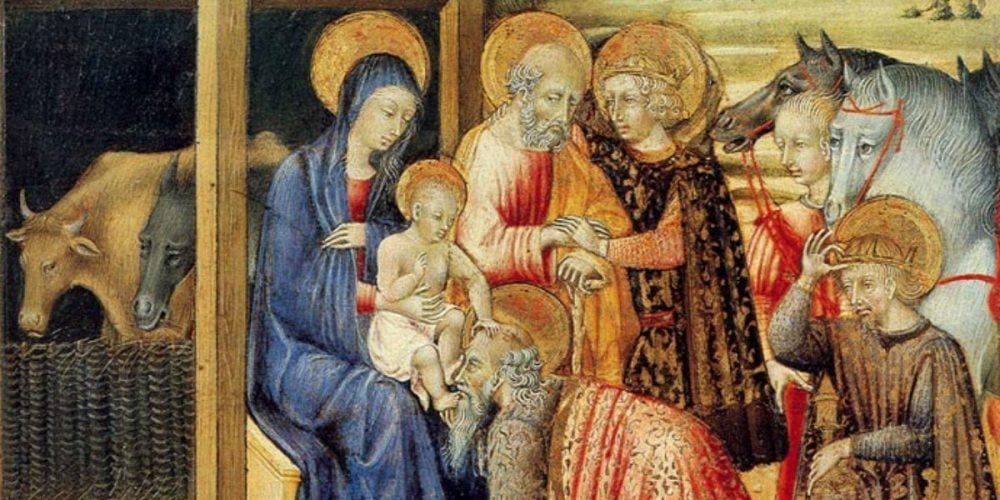O Star of Wonder
Epiphany Homily

O star of wonder, star of light,
star with royal beauty bright,
westward leading, still proceeding,
guide us to thy perfect light.
The story of the Magi—those mysterious travelers from the East—is a fitting culmination of the Christmas season. Delighting in the star those wise men make their way to the Christ child, they do him homage, they bow down and adore.
This journey of wonder, faith, and discovery, resonates deeply because it speaks of the universal quest for meaning, for truth, for God. The Magi’s story is not only their story—it is ours. It is, as the carol puts it, a star of wonder, that awakens them to embark on a journey that will transform them, to find something beyond themselves. What are the “stars” that God has placed in your life? What beauties or moments of inspiration, or even struggles have called you to journey beyond your place of comfort? The Magi would return unsatisfied with their old Kingdoms. When we discover the joy and love of Christ, old realities lose their savour.
Led by the star, guided through the deserts, facing hazards and dangers they catch a glimpse of the King of heaven and earth, and go back changed. Every journey toward God involves challenges—moments of doubt, distractions, and obstacles that threaten to turn us back. Yet the trials we face on our journey—suffering, temptation, or spiritual dryness—are part of it – they shape us, change us, help us grow.
We don’t know much about these Magi, perhaps that is why we have imposed our own stories upon them. Given them exotic names like Casper, Melchior and Balthasar. Making them representatives of the three known continents of an earlier age – Africa, Asia and Europe; or the three ages of man – look at the length of their beards. They symbolize the universality of Christ’s mission.
And people have told tales about their journey, about those whom they might have met on the way, or companions who missed the journey, or what happened when they got home. Whether poets like T.S. Eliot, novelists like Evelyn Waugh or the Russian story of the Bakushka and the Wise Men, or the novel The Other Wise Man.
We picture these Magi as Kings making their way on their camels across the desert, wearing exotic clothing and bearing strange gifts. They sensed something of the child’s destiny shown in the mysterious gifts they offered. Gold for a King, Myrrh to worship a God, and myrrh to anoint the body of baby born to die.
In Gian-Carlo Menotti’s opera "Amahl and the Night Visitors" from the 1950s, a little boy looks up to the night-sky in wonder and cries to his mother: “Oh mother come and see, there has never been such a sky. Damp clouds have shined it and soft clouds have swept it as if to make ready for a King’s ball… Hanging over our roof is a star as large as a window and the star has a tail and it moves across the sky like a chariot on fire.” But wearily his mother replies “O Amahl, when will you stop telling lies?... all you do is worry your mother with fairy tales.”
Amahl’s wonder captures the essence of the Epiphany. Like the Magi, he sees the world with eyes of awe and expectation. He recognizes the extraordinary breaking into the ordinary. Yet how often, like Amahl’s weary mother, do we dismiss such wonder as mere fantasy? Scripture reminds us: “Unless you turn and become like children, you will never enter the kingdom of heaven” (Matthew 18:3).
The feast of the Epiphany calls us to open our eyes to the extraordinary in our midst—the shining of Christ in our world, even in its darkest corners. “The light shines in the darkness, and the darkness shall not overcome it.” (John 1:5).
Amahl is a dreamer, he meets those three Kings who speaks so profoundly of the new-born child. The king says:
The child we seek
Doesn’t need our gold.
On love, on love alone
He will build his kingdom.
His piercéd hand will hold no sceptre,
His haloed head will wear no crown;
His might will not be built
On your toil.
Swifter than lightening
He will soon walk among us.
He will bring us new life
And receive our death,
And the keys of the city
Belong to the poor.
This is the heart of the Gospel. Christ’s kingdom is not of power, wealth, or domination. It is a kingdom of love, humility, and self-gift. The Child whom the Magi adore will grow up to stretch out His pierced hands on the cross. His crown will be one of thorns. And His kingdom will belong to the poor, the meek, and the merciful.
These words bring us to the heart of the Gospel. Christ’s kingdom is not of power, wealth and domination. It is a kingdom of love, humility, and self-gift. He came not to demand tribute but to offer Himself as the ultimate gift. His pierced hands will one day stretch out on the cross to save us. His crown will be one of thorns. And His kingdom will belong to the poor in spirit, the meek, and the merciful.
We, too, as pilgrims, go on our search. Week by week, we journey to this altar, and offer our gifts—not gold, frankincense, or myrrh, but our lives, our love, and our faith. And in return, Christ gives us the greatest gift: Himself. He gives us his life and his love. The love with which we are to build his Kingdom.
So let us go forward brightly in this New Year, delighting in the star and where it leads us, delighting in the Christ whom the Magi adore who today shines brightly for us.









